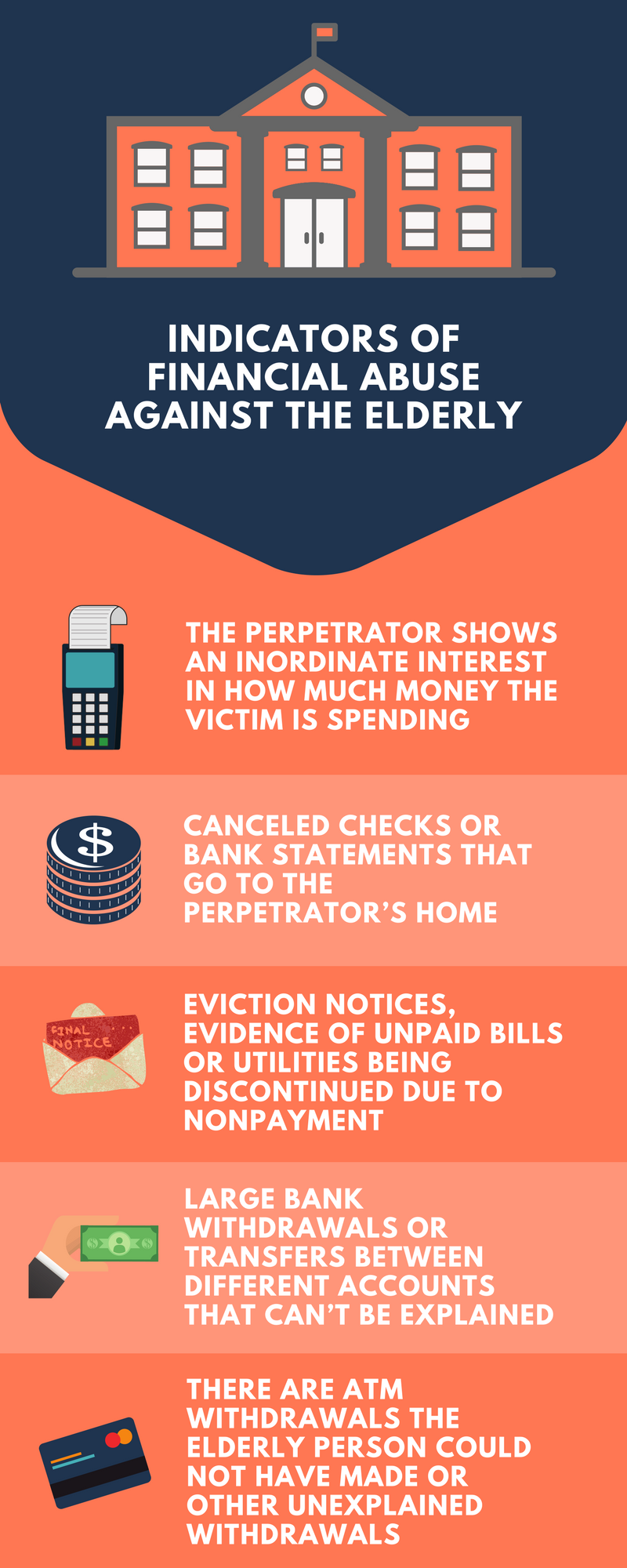Financial Nursing Home Abuse
Financial nursing home abuse, or financial exploitation, is one of many abuses that elderly people potentially face while living in an assisted living facility. It is also the most common form of elder abuse. It is estimated that roughly 500,000 elderly people annually are victims of financial abuse that live in these facilities and costs the elderly population around $3 billion dollars in this time period[1]. A 2009 study conducted by MetLife Mature Market Institute and the National Committee for the Prevention of Elder Abuse concluded that the rise in financial exploitation in nursing homes is due to advances in technology, social changes, and increased aging of the population[2]. On top of this, people who have cognitive dysfunction are more susceptible to be victims of financial exploitation. According to the Consumer Financial Protection Bureau, it is estimated that 22% percent of Americans over age seventy have mild cognitive impairment, and one in eight Americans aged 65+ has Alzheimer’s disease. The percentage of congregate care residents with cognitive impairment is much higher than the general older population: about half of nursing facility residents—and over 40% of residents in assisted living and board & care homes have dementia[3].
The most common perpetrators of elderly financial exploitation found in nursing homes are family, friends, lawyers, caregivers, fiduciaries, accountants, and bankers. The most common culprit from this list is actually the family member due to the fact that family members are often granted unlimited access to finances when designated the power of attorney. The chances of a family member committing this kind of financial abuse increases when the family member is unemployed, have financial problems, or suffer from substance abuse[4]. These financial abuses may have begun at the time of admission of the loved one to the nursing home or may go back months or years. Intervention, however, rarely begins until the exploitation causes repeated non-payment and staggering over-due bills[5].
 The common signs of financial abuse in a nursing home are[6]:
The common signs of financial abuse in a nursing home are[6]:
- Canceled checks or bank statements that go to the perpetrator’s home
- Large bank withdrawals or transfers between different accounts that can’t be explained
- Eviction notices, evidence of unpaid bills or utilities being discontinued due to nonpayment
- The perpetrator refers to the elder as their new “best friend”
- The elder person’s care is substandard even when they can pay for it
- There are ATM withdrawals the elderly person could not have made or other unexplained withdrawals
- The elderly person is coerced to sign powers of attorney or other legal documents they didn’t understand.
- The perpetrator shows an inordinate interest in how much money the victim is spending
- There are missing belongings or property that is missing
- There are forgeries on legal documents or on checks
- Financial arrangements are sketchy and lack documentation
- The explanations about the elder’s finances as explained by the perpetrator are implausible.
- The elderly person does not know or understand their own financial situation.
Don’t be a victim of financial abuse. Here are some tips on avoiding financial abuse while living in a nursing home[7]:
- Checking reviews of nursing facilities, and references before hiring anyone to administer care
- Use automatic bill paying systems and direct depositing for checks
- Communicate with banks and financial institutions to look for suspicious activity
- Consider a geriatric care manager to oversee complete care, including finances
- Reduce isolation and be weary of caregivers who attempt to excessively isolate a resident
[1] http://www.nursinghomeabuseguide.org/financial-abuse/
[2] http://nursinghomeabuseguide.com/elder-abuse/financial/
[3] http://files.consumerfinance.gov/f/201406_cfpb_guide_protecting-residents-from-financial-exploitation.pdf
[4] http://www.nursinghomeabuseguide.org/financial-abuse/
[5] http://files.consumerfinance.gov/f/201406_cfpb_guide_protecting-residents-from-financial-exploitation.pdf
[6] https://www.nursinghomeabusecenter.com/elder-abuse/types/financial-abuse/
[7] http://nursinghomeabuseguide.com/elder-abuse/financial/
